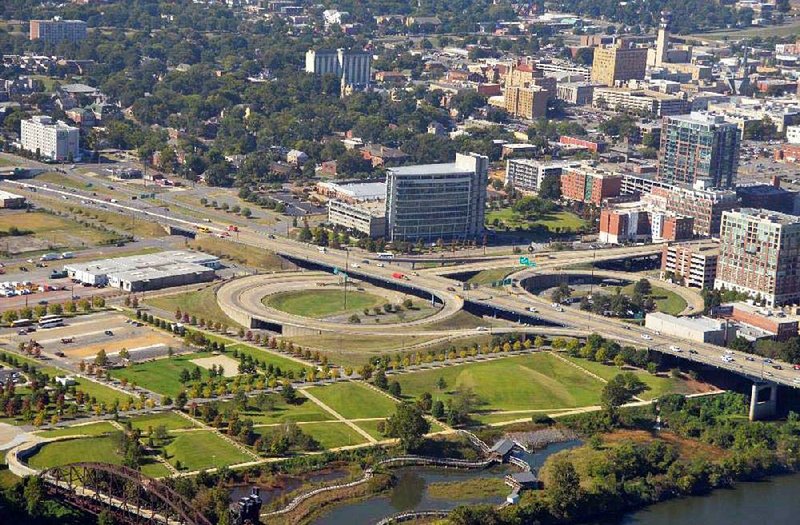The Metroplan board of directors voted Wednesday to amend the agency's long-range transportation plan to increase the amount of money available for the Arkansas Highway and Transportation Department's Interstate 30 corridor project through downtown Little Rock and North Little Rock.
RELATED ARTICLE
http://www.arkansas…">Board adds 10th for agency search
The move, which increases the amount to $631.7 million, from about $300 million, was necessary to sync the regional agency's long-range plan with the state's transportation plan, officials have said. That is a Federal Highway Administration requirement before federal funds can be spent on highway projects.
The vote approving Amendment 1 to the agency's long-range transportation plan, known as Imagine Central Arkansas, smooths the way for federal approval of a statewide transportation improvement plan, which includes money for other road and transit projects in central Arkansas that are expected to begin over the next five years.
The Arkansas Highway Commission is scheduled to vote on the statewide transportation improvement plan next week. It contains almost 700 projects, worth an estimated $4.8 billion, that state highway officials plan to construct over the next five years. It sets aside $631.7 million for the I-30 project, referred to by the department as 30 Crossing.
Under federal law, the regional plan must be consistent with the state plan in order for federal funds to be expended. Metroplan and Highway Department officials said the Highway Commission would have no choice but to approve the state plan without the regional plan if the two plans aren't in accord.
Changing the state plan would require a public-involvement process that likely would preclude approval before the new federal fiscal year begins Oct. 1.
"This just allows us the option to keep a full slate of options," said Conway Mayor Tab Townsell, a board member.
The region's transportation improvement plan contains $638 million in federal funding for state highway and transit projects, as well as $733 million in state funding under the Connecting Arkansas Program, a $1.2 billion road construction program that is largely financed with a 10-year, one-half percentage point increase in the statewide sales tax that voters approved in 2012.
That money represents funding for 30 to 40 projects in the region, Casey Covington, a Metroplan planner, said in response to a question from Little Rock Mayor Mark Stodola.
The voice vote by the Metroplan board, composed of the region's mayors and county judges, came a week after an advisory panel recommended approval of the amendment. The Regional Planning Advisory Council, though, took pains to note that approving the amendment did not equate to endorsing the four construction alternatives the state Highway Department has so far proposed for the I-30 project.
Charles Cummings, the council chairman, repeated those concerns in an address to the Metroplan board before Wednesday's vote.
Imagine Central Arkansas, the product of a lot of public input, identified about $300 million for improvements to the 6.7-mile I-30 corridor between Interstate 530 in Little Rock and Interstate 40 in North Little Rock.
The amendment more than doubles the amount of money for the corridor and leaves available the option to widen it to eight or 10 lanes. Imagine Central Arkansas includes a longtime regional policy of limiting area freeways to six lanes, which would allow more robust development of the region's nonfreeway roads.
"We are struggling with the recommendations of Imagine Central Arkansas versus 30 Crossing," Cummings said. "We're not there yet."
Kathy Wells, the president of the Coalition of Greater Little Rock Neighborhoods, was one of three people who spoke against the amendment's adoption.
She said the project's costs don't take into account the effect it will have on surrounding freeways, which Metroplan analysis shows will require future widenings to accommodate the increased traffic the new corridor would attract.
The project, Wells said, will "present a bill that this board and your constituents are going to pay for years down the road."
Metroplan has received 196 comments from the public on the amendment. A total of 117 comments were against either the amendment or the project itself, Covington said. Of those, 54 were against the amendment. Another 73 were filed in support of the amendment, he said.
"There is still significant disagreement in both the design and the purpose and need of the project," Covington said.
He said the amendment includes language that will require another vote of the Metroplan board once the corridor design is finalized before it can go to construction. It likely will take place at the end of the year, said Jim McKenzie, the agency executive director.
Townsell called that provision significant.
"We are the bottleneck," he said. "Metroplan has the trump card in this project."
Given the disagreement over the scope of the project, Townsell said he doubted a final design will be the product of a "consensus" and therefore it was incumbent upon all board members to do their "homework."
"We are going to have to make a hard choice," he said. "This isn't just going to happen. It's going to come down to our vote."
Metro on 05/26/2016
